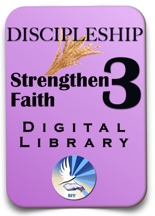
Redemption Through The Scriptures: The Purpose for Redemption
The Two Testaments and Covenants
Paul J. Bucknell
Purpose | Curtain | Closer | Two Covenants | Mosaic Covenant |
Belonging | Change of Covenants | New Covenant | Fellowship | Questions
God’s Purpose for His People
God has higher goals in sending Jesus to die for us than we normally think. This incomplete perspective greatly weakens our trust of His involvement in our lives.Learning these two major purposes, on the other hand, will certainly help you rethink your Christian lives!
The Two Testaments and Covenants
Before introducing each covenant and showing its innate design to bring and allow God’s people to live in His midst, it is important the terms are clarified. The Old Testament and the New Testament are special terms describing the two large sections of the Bible as it is commonly known.
Some
add a third part called the Apocrypha or Intertestamental books, but these were
not accepted as part of the canon of scripture by the Jewish people or Jesus.
The Old Testament describes all the scripture books from Genesis to Malachi
(English bible order) while the New Testament including Matthew to the Book of
Revelation, books that were written a fter the life of Christ on earth.
fter the life of Christ on earth.
These two larger sections of the Bible do generally describe the Old Covenant and New Covenant. Testament is just another word for covenant so there can be confusion.
But it is important that they are considered as a unity and that though the Old Testament is largely focused on introducing the Old Covenant by Moses and the New Testament the New Covenant, these sections of the Bible describe and write about much more. For example, Genesis describes times before the Mosaic Covenant was given, but it serves an important part describing the right God has to make a covenant with His people.
The Old Testament Covenant
Genesis to Deuteronomy, the first five books of the Bible are
known as the Law (in Hebrew Torah)
or from the Latin, the Pentateuch. The Old Covenant, as it has come to be known
in Christian circles, was first known just as the Sinaitic covenant or Mosaic
covenant to distinguish it from other covenants. Another example of a covenant
is the Noahic covenant that God made with Noah after the flood (Gen 9:1-17).
Several times God uses the word ‘covenant’ to describe this agreement with Noah
and his sons (which includes all of mankind) (Gen 9:9,11,12,13,15,16,17). 
These covenants were special agreements from a more powerful party with a lesser, usually a subdued party such as a nation defeated in war. The term might not always be used to describe such an agreement but usually is. Each covenant had a sign, sacrifice and terms.
When it speaks of the Lord making a covenant with the people of Israel, it clearly refers to the terms set by God. The terms were not negotiable and could not be arbitrarily changed. The terms were firm and consequences of breaking the covenant were in force (2 Chr 7:19 onwards).
If we look at the Torah as one book, then we can see how Genesis introduces God and the family He would choose to institute this covenant, the family descended from Jacob (his new name was Israel-Genesis 32:28). Exodus traces the birth of the nation Israel along with her birth cries in Egypt as well as their entrance into the land God had prepared. Everyone has their origin from God, but Israel would uniquely be called God’s people. The Ten Commandments form the beginning part of the Mosaic covenant with the nation of Israel.
Next ->The Mosaic Covenant
info@foundationsforfreedom.net
Scriptures typically quoted from the New American Standard Bible unless noted:
(C) Copyright The Lockman Foundation 1988










